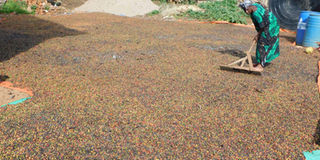Prime
Making smallholder coffee farming more profitable

A farmer spreads out coffee on a tarpaulin sheet for drying. Photo / Michael J Ssali
What you need to know:
- Thousands of small-scale coffee farmers are still stuck in poverty although Uganda is only second to Ethiopia in Africa in coffee production and coffee is the world’s most traded commodity after oil.
Small-scale coffee farmers currently face too many challenges for them to earn maximum profit from the crop. Thousands of small-scale coffee farmers are still stuck in poverty although Uganda is only second to Ethiopia in Africa in coffee production and coffee is the world’s most traded commodity after oil.
Coffee journey
One of the reasons for this sad position could be lack of proper education among our farmers about the coffee journey from the farm to the dining table.
Some of them do not even seem to understand that coffee is actually food and that it must be handled as such. A lot has got to be done to reverse the situation and to enable Ugandan smallholder farmers to discover the hidden treasure in coffee farming.
Best practices
Profitable coffee farming begins with the right planting material and good agronomic practices. The farmer should plant high yielding coffee varieties and he or she should as much as possible endeavor to apply fertilisers where the soil is poor and to handle the crop properly in order to attract good prices. The farmers should also plant varieties that are not prone to common pest and disease attacks. Everyone should seek to read the manual authored by Joseph Nkandu, executive director of National Union of Coffee Agri-businesses and Farm Enterprises (NUCAFE) titled: “The Farmer Ownership Model Development Manual.”
The manual gives a very precise description of how smallholder coffee farmers are vulnerable to exploitation and what can be done to minimise the farmers’ losses.
Exploitation
Nkandu for example gives a simple picture of how smallholder farmers suffer losses at the hands of middlemen pausing as coffee traders. The smallholder farmer has no personal weighing scale. He waits for the trader to use his weighing scale to tell him how much his coffee weighs. Most farmers in fact don’t even know how the weighing scale operates. But the traders often tamper with the weighing scales and can deduct as much as five kilogrammes or even more from every bag of coffee produced by the farmers.
The loss can be worse for farmers who cannot read or write. Smallholder farmers also do not have personal moisture metres and they always wait to be told by the same ruthless trader the moisture content percentage of their coffee.
In many cases the metre is tampered with. Now even when the moisture is the allowed level (between 13 and 14 percent) the trader will still claim that it is not the right level and cunningly inform the farmer, “I will buy your coffee anyway but since the moisture level is above normal I will pay you a little less by a deduction of four kilogrammes.” The trader may also deduct the inflated weight of the gunny bag containing the farmer’s coffee. Most often the traders take advantage of farmers’ vulnerable financial circumstances and pay far less than would have been the fair value of the coffee in the garden, causing untold losses to the farmers.
But when a poor farmer badly needs cash to pay their children’s school fees or any other pressing need and has no alternative source of money, selling his coffee when it is still in the garden or leasing out his garden seems the next best option.
Form farmer groups
Nkandu’s solution to such issues is for farmers to form groups and associations. In their groups the farmers can pool resources and buy their own weighing scales and moisture metres. Good weighing scales and moisture metres are generally expensive but when a group collectively owns a gadget it can be used in turns by all members so that they are certain of the weight and moisture content of their crop. Ideally every farmer should own his or her own weighing scale and moisture meter so that he is certain of the weight and moisture content of his coffee to avoid being cheated by the trader. Farmers’ groups can even edge out middlemen or traders by collecting their coffee together and selling it in bulk directly to exporters at well negotiated prices.
Kibinge Coffee Farmers Cooperative Society Chairman, Sowedi Sserwadda has a solution to most of the smallholder farmers’ problems.
“We formed our own SACCO where all our farmers have opened up saving accounts. Now when any of our farmers has a pressing problem such as school fees or taking a family member to hospital they can withdraw their savings or negotiate for loans which they can settle later during the coffee harvesting period,” says Sserwadda.
Advice
All farmers must realise that the lower the stage at which they sell their coffee on the coffee value chain the less money they get.
The lowest stage on the value chain is selling the crop to the traders when it is still in the garden.
This means that at the time of harvesting it is the trader who picks the coffee from the garden when it is ripe. The farmer earns more money when he or she sells red ripe cherries. The profit is higher when the farmer sells dry cherries (kiboko). The farmer still enjoys far bigger profits when he or she sells husked coffee or coffee beans (kase or FAQ). Profits are a lot higher when the farmer sells roasted coffee beans. The highest profit is obtained when the farmers sell ground or powder coffee.
Another advantage of forming groups and associations is that the farmers will be one another’s supervisors and ensure that they conform to the good coffee farming practices that lead to good quality coffee production.
Key fact
All farmers must realise that the lower the stage at which they sell their coffee on the coffee value chain the less money they get.
The lowest stage on the value chain is selling the crop to the traders when it is still in the garden. This means that at the time of harvesting it is the trader who picks the coffee from the garden when it is ripe. The farmer earns more money when he or she sells red ripe cherries.




